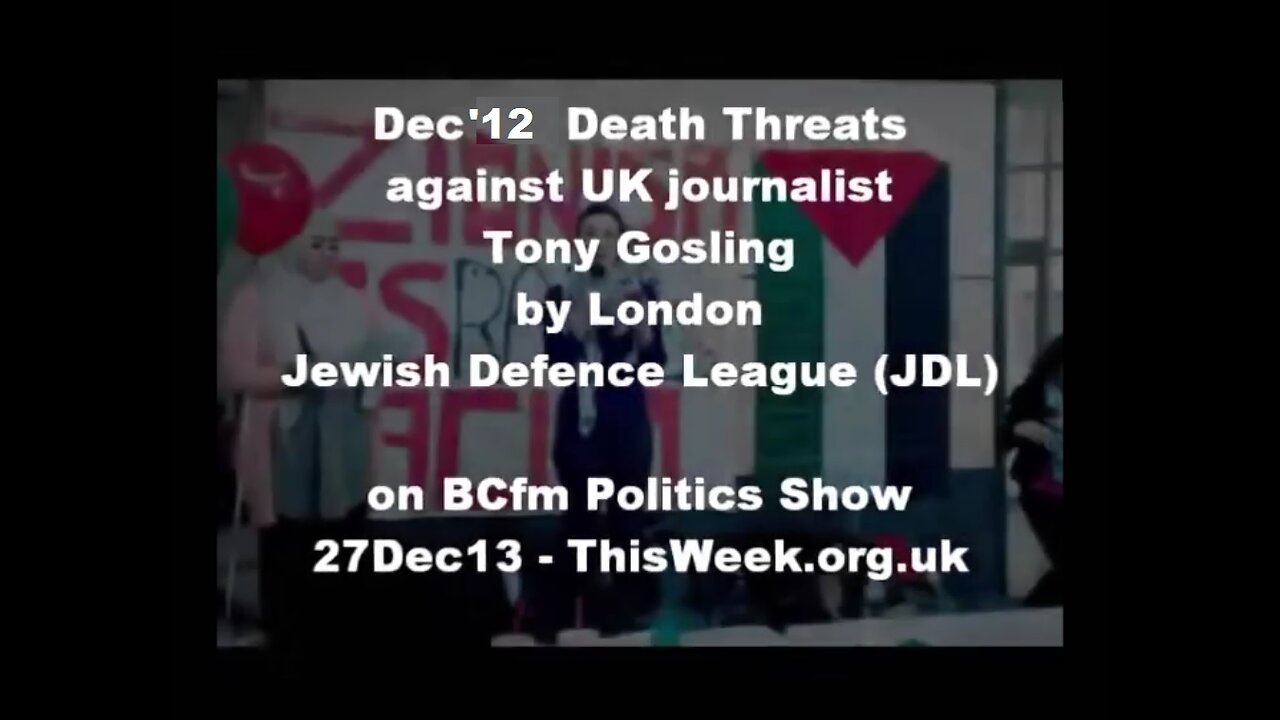Premium Only Content

Turning a migrant crisis into a race war, Israel'sTommy Robinson flees to Spain helped by Met Police
Richie is joined by author and broadcast journalist Tony Gosling. Tony discusses the deadly knife attack in Southport, the police and media response to it, the subsequent unrest across the UK, where misinformation originates and who it benefits.
The guys also discuss the rising tension in the Middle East, the assassination of key Hamas and Hezbollah leaders and more.
The riots have been instigated by the Zionist asset Stephen Yaxley-Lennon ('Tommy Robinson'), who has been working for the State of Israel since 2009 as part of the so-called 'counterjihad' Islamophobia movement established by that state. When his organisation, the English Defence League, was incorporated in 2011, two years after its inception, it was named the English & Jewish Defence League. The Jewish Defence League, a Zionist terrorist organisation, has been a key part of violent Islamophobic street thuggery in the UK over the past decade.
https://twitter.com/Tracking_Power/status/1819696060941627553
What we know about Tommy Robinson's whereabouts after he flees UK
https://uk.news.yahoo.com/tommy-robinson-flees-court-arrest-update-where-134250695.html
Tommy Robinson has fled the UK, according to the High Court, following his arrest over the weekend.
1000 extra police were drafted in to manage and keep part the opposing demonstrations in central London. Tommy Robinson led his Take Our Country Back march from the Royal Courts of Justice to Trafalgar Square. The Stand Up to Racism march went from Russell Square to Whitehall.
A judge has issued an arrest warrant for Tommy Robinson after he left the UK following a "flagrant" contempt of court, the High Court has heard.
The far-right activist, 41, whose real name is Stephen Yaxley-Lennon, was due to appear at the Royal Courts of Justice in London on Monday for a hearing but failed to attend.
The case came when the solicitor general launched legal action against Robinson in June over an alleged breach of a court order after he lost a libel battle in 2021.
Thousands of his supporters attended a march in central London on Saturday, a day before Robinson was arrested after being stopped at a port in Kent.
What we know
Robinson was due to appear before the High Court on Monday after being accused of continuing to talk online about a libel case he lost in 2021.
The court heard that Robinson has left the country after committing "flagrant" contempt of court relating to a film played at a protest in central London.
Watch: Crowds gather for Tommy Robinson protest and counter-march
Crowds gather for Tommy Robinson protest and counter-march
Scroll back up to restore default view.
He is accused of an alleged breach of a court order after losing the libel case three years ago.
Adam Payter, representing the solicitor general, said on Monday it is believed Robinson left the UK hours after being released on unconditional bail following his reported arrest over the weekend.
Payter said Robinson was arrested following Saturday's “large demonstration” in central London, which featured the showing of a film that was “central to this application” and showed a “flagrant” and “admitted” breach of the court order.
He said that following the demonstration, Robinson was stopped in Folkestone, Kent, during a port stop and search and arrested by Kent Police under the Terrorism Act 2000.
“We understand he failed to co-operate with a port stop and search," said Payter. "The implication is he was attempting to leave the country and therefore was not intending to attend this hearing this morning.”
He added that Robinson was reminded of Monday’s hearing before being released on unconditional bail at 10pm on Sunday, but that it is now believed he “left the UK last night and there was nothing to prevent him from doing so”.
Kent Police said a 41-year-old man was detained by officers on Sunday under Schedule 7 of the Terrorism Act 2000 and was released on bail while inquiries continued.
Under schedule seven of the Terrorism Act, police are allowed to stop anyone passing through a UK port “to determine whether they may be involved or concerned in the commission, preparation or instigation of acts of terrorism”.
The High Court heard that Robinson “is not within the jurisdiction of the UK”, and Payter claimed Robinson had returned to the country “with the purpose of publishing the film” before leaving again “to put himself beyond the reach of this court’s jurisdiction”.
Mr Justice Johnson issued a warrant for Robinson’s arrest after he did not attend the hearing, but ordered that it not be carried out “until early October” to allow Robinson time to indicate that he would attend the next hearing voluntarily or to apply to “set aside” the warrant.
-
 2:03:11
2:03:11
TheDozenPodcast
6 hours agoFootball villain fighting the state: Joey Barton
55 -
 LIVE
LIVE
Scottish Viking Gaming
8 hours ago💚Rumble :|: Sunday Funday :|: Smash the Blerps and Vape the Terpes
1,017 watching -
 1:45:00
1:45:00
RG_GerkClan
10 hours ago🔴LIVE Sunday Special - It's Time for World Domination - Civilization VII - Gerk Clan
49.1K20 -
 LIVE
LIVE
Major League Fishing
4 days agoLIVE Tackle Warehouse Invitationals, Stop 1, Day 3
156 watching -
 23:34
23:34
marcushouse
11 hours ago $14.43 earnedBREAKING: Starship Launch IMMINENT – But What’s This SURPRISE Flight 9 Plan?! 🚀🔥
98.8K9 -
 8:43
8:43
Film Threat
1 day agoTHE MONKEY | Film Threat Reviews
89.9K3 -
 15:55
15:55
TSPLY
1 day agoThe Media Is Very Afraid Of FBI Director Kash Patel
70.7K57 -
 6:57
6:57
Cooking with Gruel
1 day agoMake Cheese Great Again
59.5K24 -
 5:17
5:17
Mrgunsngear
1 day ago $9.77 earnedPresident Trump Has Appointed A New ATF Director
59.5K40 -
 48:17
48:17
Athlete & Artist Show
9 days ago $7.80 earnedS5E1: Chucky Announces First Kid, 4 Nations Face Off, and more!
102K4